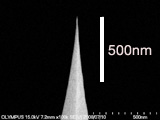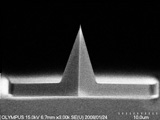
(Common features in new silicon cantilever series)
Spring constant of 2 N/m(Typ.) is the smallest in our silicon cantilevers for AC mode, suitable for observing surface topography and viscoelasticity of soft samples.
Cantilever base material employs N-type doped silicon with a surface resistance of 0.01-0.02 Ω · cm (1/200th the surface resistance of our other base materials). This can be achieved to use for measuring surface potential and other applications.
The apex of the tetrahedral probe is ideally point terminated.
The tetrahedral probe shows good symmetry viewed from the front.
The probe can be easily positioned at the exact point of your interest due to ‘TipView’ structure.
The probe is located at the exact end of the cantilever so that the probe apex is not obscured during optical observations.



Thin aluminum film with the thickness of 100 nm is coated on the cantilever for reflecting light from the deflection sensor in the AFM equipment. High reflex for high S/N sensing can be expected.
The ideally vertical side-walls of the chip make tweezing easy and eliminate problems with chipping and debris.